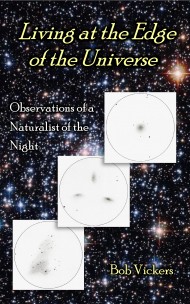My next astronomy project is the Astronomical League’s Galaxy Groups & Clusters. I figured this would be a good project for the 18” Obsession as it would give me a good bit more light grasp than my 12.5” Dob. It should allow me to see some of the fainter galaxies in the list as well as seeing the brighter ones bigger and better. For this program, you are supposed to observe at least 120 of the 250 “objects” listed, including at least 30 galaxy trios, 30 Hickson compact galaxy groups, 30 Additional galaxy groups, and 30 Abell galaxy clusters.
To choose from, you are given lists of 50 galaxy trios from the Atlas of Compact Galaxy Trios by Miles Paul, 99 Hickson Compact Galaxy Groups, 50 Additional galaxy groups, and 50 Abell clusters. Einstein’s Cross is included as a challenge object.
I am using the Galaxy Groups and Clusters guidebook by Robert McGown and Miles Paul. I will try to post these observations more or less as I do them.
Wednesday evening of last week was cool and clear with the crescent Moon setting early behind the trees in the west. It was an excellent night to begin a new project. I chose as my first target one of Miles Paul’s Compact Galaxy Trios, Number 40 in Delphinus, consisting of NGC 6928, 6930, and 6927 (6930 is mistyped in the guidebook as 6929.) There is also a fourth, very small and faint galaxy (NGC 6927A) about 2 arcmin south of N6927. According to my logbooks, I had visited this little group twice before with my 12.5” Dob — once in 2003, when I could see only the two brighter galaxies, N6928/6930 and once in 2009 when I also just glimpsed N6927 with averted vision, but not N6927A. This time, with the 18 inch, all three of the trio were pretty readily apparent and I also pulled in N6927A with averted vision about 20% of the time. Click on the Galaxy Groups & Clusters link in the header above and see my Trio #40 entry and sketch for more details.


